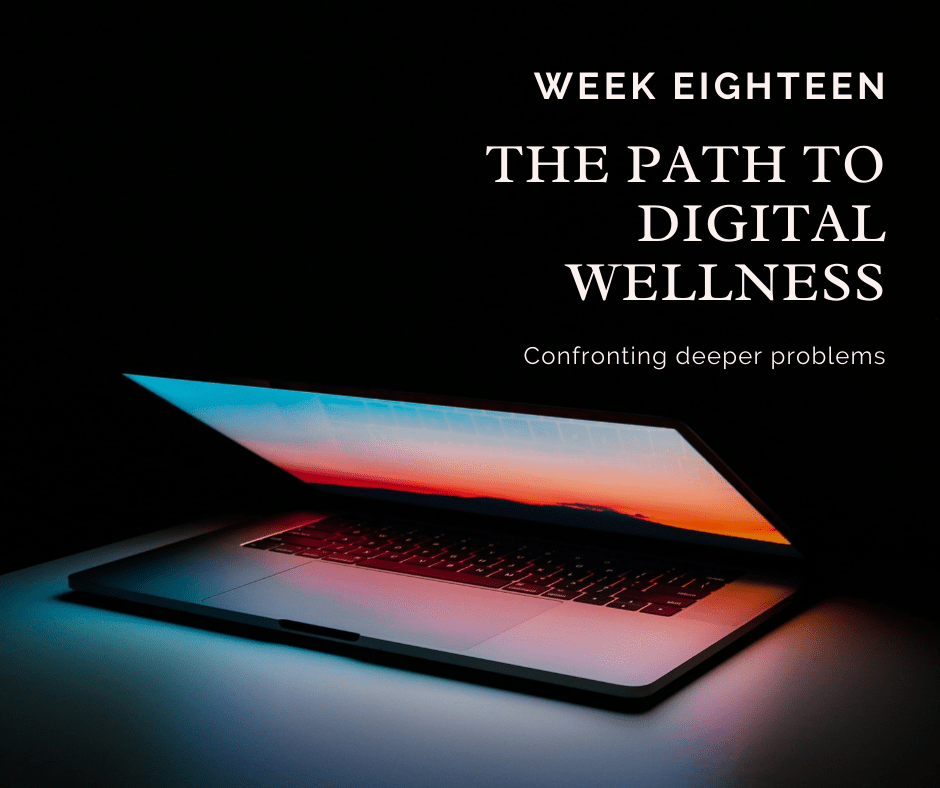This eCourse was designed for people whose digital habits have driven their lives out of balance.
But what if your life isn’t merely out of balance, but in danger of capsizing entirely?
If that’s the situation you’re in, it may be because a more serious problem, such as a mental health condition and/or digital addiction, is also in the mix, (and may have become even more pronounced in the wake of the Covid-19 pandemic.)
We’re going to explore both problems this week as they pose special challenges on the path to digital wellness. (If neither issue applies to you, feel free to rejoin us next week for the penultimate post in this eCourse.)
If you’ve tried to make changes the past 17 weeks but are still floundering, this may be the post for you.
Digital’s Affect on Your Mental Health
Thus far we’ve assumed your digital habits are causing you distress, but not actual harm. But that’s not often the case for people with mental health issues like anxiety or depression.
For those people, (I include myself in this category) daily digital habits can be particularly powerful. That’s because digital tools can offer both comfort and escapism from the symptoms of mental health conditions, but can ALSO sometimes inadvertently make those symptoms worse.
For example, the loneliness of depression can drive people to use social media more heavily, but that heavy use can also expose them to more content and interactions that could potentially exacerbate their depression.
This problem can occur across a range of digital platforms…
- Multiple studies have found a strong link between heavy social media use and an increased risk for depression, anxiety, self-harm, and even suicidal thoughts.
- Binge watching TV can lead to fatigue, sleep problems and mood disorders like depression and anxiety.
- Smartphone dependency can lead to depressive symptoms.
Consider this a “chicken or the egg?” kind of problem. Your existing mental health condition might be causing you to develop unhealthy digital habits AND/OR your unhealthy digital habits might be causing you to develop a mental health condition, (or for an existing condition to worsen).
Regardless of the initial trigger, the solution is to accept that your relationship with technology is more complex than the average person. It may take more effort for you to make changes in your digital habits and you should approach that task by working on your mental health AND your digital wellness at the same time.
When It’s an Addiction, Not Just a Habit
Digital addiction is a very real thing, whether that’s a phone addiction, social media addiction, Internet addiction or using digital tools to feed other compulsions or addictions like gambling, gaming, shopping, pornography, or cybersex.
Although digital addictions are often written off with the same trivializing language we use for “overdoing” other things in our life, (i.e. “I’m addicted to kale chips!”) having an addiction to anything is a serious problem that can destroy lives, careers, and families.
Problem is, because our technology use is so pervasive, complex, and ever-changing, it can be difficult to assess which parts are problematic, much less “addictive.”
Here’s a place to start…
- If you have trouble completing regular tasks at home/work or find yourself “losing time” in your day to your digital habits…
- If you find yourself neglecting or jeopardizing parts of your life, (career, relationships, opportunities) or becoming isolated from friends and family…
- If you find yourself hiding to use your digital devices, lying about how much time you’ve spent using them, or become irate if you’re interrupted…
- If you have irrationally high levels of FOMO or are preoccupied with thoughts about what’s happening online when you’re not there…
- If your use of technology has moved from “regular” to “compulsive,” or you need to be online/using tech increasing lengths of time in order to feel calm/satisfied…
- If you find yourself freaking out whenever your tech runs out of battery, you can’t find a device, or you have trouble logging into an account…
- If you find yourself with increased anxiety or depression, increased stress, disturbed sleep, or less ability to concentrate or be creative…
- If you’ve already made repeated efforts to set boundaries or cut back on usage but were unsuccessful…
…You might have a problem.
If that’s the case, again accept that it may take more effort for you to make changes in your digital habits and you should approach that task by working on your potential addiction, (which is likely also being affected by your mental health) AND your digital wellness at the same time.
This week’s exercise
Neither of these problems are going to be solved this week, nor am I the person to help you solve them. Our goal is simply to identify what’s going on and figure out the first step you can take to address it.
- Maybe it’s time to find a therapist, (many have converted their in-person practices to telehealth) to talk through your concerns.
- Maybe it’s time to talk to your doctor about medication to help you function better on a day-to-day basis.
- Maybe it’s time to admit that you are powerless over your addiction and that your life has become unmanageable. (Step 1 in most 12 Step recovery programs)
- Maybe it’s time to admit that this eCourse isn’t for you — that you’ve got bigger things to work on first. (If that’s the case, I thank you for joining us thus far and invite you to double back to review this content — which will remain free online — when you’re at a better place in your life.)
I wish you the best wherever your journey takes you and hope you continue to be healthy and safe.
I’d love to hear your thoughts on this course. Feel free to leave comments on any of the posts or email me at jen@jenkane.com if you’d like to share something privately.







